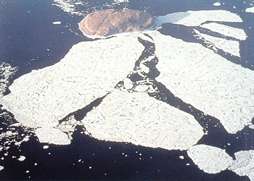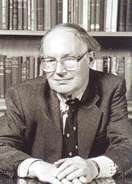| enginuity |
|
Ice work (if you can get it)
Ice has always been a source of fascination for Professor Andrew Palmer, who holds the newly created chair of Petroleum Engineering. 'In the Arctic, there are continuous sheets of ice, 2m thick, with ridges up to 30m thick,' he explains. 'Although ice is an incredibly brittle material, when there is a lot of it driven by wind and waves it can exert very large forces, a hundred thousand tonnes or more. It is uncertain how large these forces actually are, and estimates vary by a factor of ten.'

A floating ice mass, about 4km across, splits after colliding with an island.
Cracking up
The reason for this uncertainty is the way the cracks are generated: they form an interacting network, behaving differently from the single cracks normally analysed in solid mechanics. With many oil and gas exploration developments now being considered in Arctic regions, the cost penalties of using the wrong value of ice force are are so great that certain exploration projects would get shelved unnecessarily.
Professor Palmer graduated from Cambridge in 1961, and after completing his PhD at Brown University in the USA, folowed by a spell at Liverpool, returned as a lecturer in 1967. Wanting to try real engineering and frustrated by the bureaucracy and endless committees of the University, he joined a consultancy firm, RJ Brown, in 1975, with which he led an exciting life, with projects in the Canadian Arctic, the North Sea and the Middle East. After another brief spell in academia, as Professor of Civil Engineering at UMIST (1979-82), he again departed to the immediacy of consultancy work, eventually setting up his own company in 1985. In 1993 he returned to Cambridge, to the Chair of Petroleum Engineering which was set up by a former undergraduate of the Engineering Department, Hamidjafar, now Chief Executive of Crescent Petroleum in the UAE.

Professor Andrew Palmer.
'The university turned its back on the North Sea offshore industry in the 70s at a time of great opportunity,' comments Professor Palmer. 'I am now excited by the prospect of developing teaching and research in this vital area.' A teaching module and research projects are now open to fourth-year students, both of which involve lecturers from the industry. Research projects, most of them in collaboration with the industry, include drilling, pipeline buckling, trenching and enhanced recovery.
Enquiries to Professor Andrew Palmer Tel: (01223) 332718, e-mail: acp24@eng.cam.ac.uk
| number 6, summer '97 |